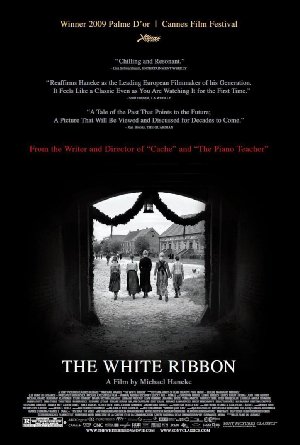
Good Movies Box
The White Ribbon (Das weiße Band - Eine deutsche Kindergeschichte) (2009)
Director:
Michael Haneke
Writer:
Michael Haneke
Starring:
Ulrich Tukur, Christian Friedel, Ernst Jacobi, Leonie Benesch
Michael Haneke's insightful film about a small rural community in the early 20th Century.
Shot in a visually powerful black-and-white that adds great depth to the film’s historical feel, Das weiße Band mainly revolves around the children and teenagers in a small Protestant village in Northern Germany, in the years before The Great War. A series of strange occurrences take place in their rural community – a farmer’s wife dies, a local doctor is injured, children are abducted, crops and property are destroyed – and nobody seems to really know who is responsible for these events or the motivation behind them.
Haneke, who himself said about his film that it's about "the origin of every type of terrorism, be it of political or religious nature," without showing what really happens, succeeds in creating and sustaining an overwhelming atmosphere of generalized dread, thoroughly managing to get under the viewer's skin and stay there over the course of the entire film.
Plot summary from IMDb: From July, 1913 to the outbreak of World War I, a series of incidents take place in a German village. A horse trips on a wire and throws the rider; a woman falls to her death through rotted planks; the local baron's son is hung upside down in a mill; parents slap and bully their children; a man is cruel to his long-suffering lover; another sexually abuses his daughter. People disappear. A callow teacher, who courts a nanny in the baron's household, narrates the story and tries to investigate the connections among these accidents and crimes. What is foreshadowed? Are the children holy innocents? God may be in His heaven, but all is not right with the world; the center cannot hold.
Awards: Nominated for 2 Oscars. Another 54 wins & 34 nominations.
Runtime: 144 min
-
 She is small, but dangerous. Wherever Benni ends up, she is immediately expelled. The wild 9-year-old girl has already become what child protection services call a "system crasher". And she is certainly not loo (more...)
She is small, but dangerous. Wherever Benni ends up, she is immediately expelled. The wild 9-year-old girl has already become what child protection services call a "system crasher". And she is certainly not loo (more...)
-
 Francois is a petty drug dealer whose dream is to settle down and set up a Mr. Freeze's ice lolly franchise in Morocco. But his ambition is smashed to pieces when he discovers that his own mother, a compulsive (more...)
Francois is a petty drug dealer whose dream is to settle down and set up a Mr. Freeze's ice lolly franchise in Morocco. But his ambition is smashed to pieces when he discovers that his own mother, a compulsive (more...)
Subscribe
Subscribe to our mailing list to get the newest movie updates to your email inbox.

